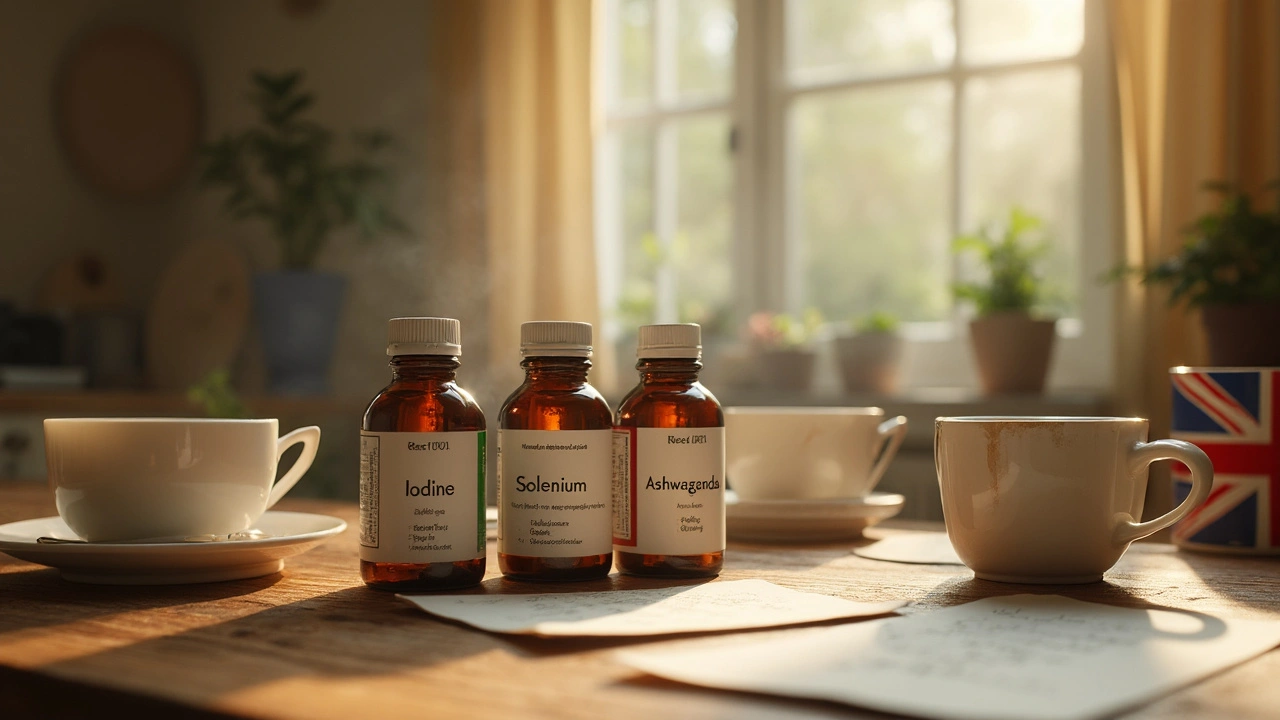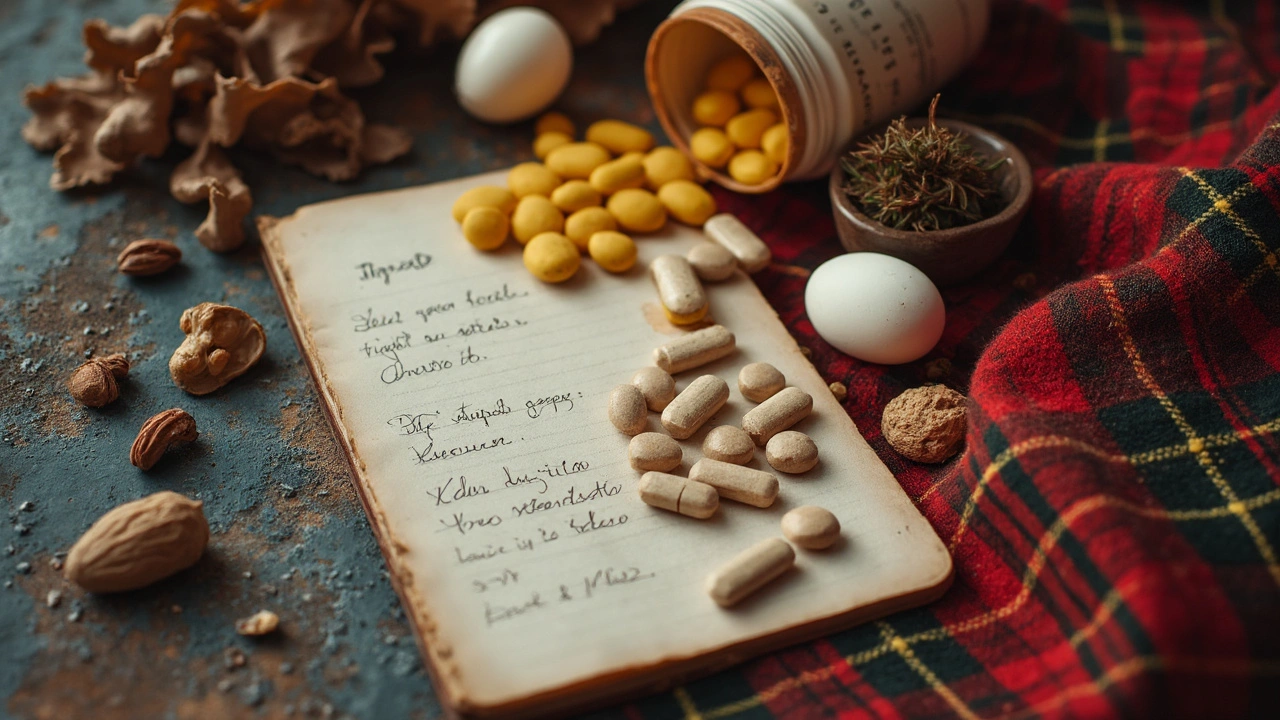Best Supplements for Thyroid Health: Iodine, Selenium, and Ashwagandha Explained

Why the Thyroid Needs a Helping Hand
If you’ve ever felt sluggish for no clear reason, or noticed your hair thinning, you know just how much the thyroid controls. This tiny, butterfly-shaped gland in your neck decides how fast—or slow—your body burns energy. When it's out of sync, everyday life just feels off. Fatigue, weight changes, dry skin, brittle nails, memory fog, and feeling cold all the time are just a few signals something may be up. That’s why more folks are searching “supplements for thyroid” these days, hoping for ways to nudge this crucial system back to balance.
Doctors usually do blood tests to check thyroid hormone levels, especially TSH, T4, and T3. Even if you’re not diagnosed with full-blown hypothyroidism or hyperthyroidism, you might fall in a gray area called “subclinical.” Symptoms tend to creep up, and lifestyle tweaks—including careful supplement use—often become part of the plan. But don’t get sucked in by every flashy label or friend’s anecdote. Not every supplement makes sense for everyone, so knowing what really helps (and what doesn’t) is a must before heading to the vitamin aisle.
Thyroid function relies on several nutrients that you actually get from your diet or, when necessary, from supplements. Iodine and selenium stand out as two essentials, each with clear science behind their roles. Ashwagandha, meanwhile, has gone from being an old-school herb in traditional medicine to a modern-day favorite for hormone balance. Understanding what they do (and don’t do) can help you decide if they belong in your thyroid routine.
Iodine: The Original Thyroid Supplement
Iodine isn’t just some old-school cure that your grandparents talk about. It’s absolutely vital for building the hormone T4, which the thyroid churns out daily. Without it, your thyroid can’t function. Historically, regions far from the sea had tons of deficiency problems, literally causing people’s thyroids to swell up into goiters. That’s why table salt started getting iodized nearly a century ago.
The CDC reports that iodine deficiency is less common in the U.S. now, but not impossible. Folks cutting back on salt, eating mostly processed foods (which aren’t iodized), or going vegan may risk coming up short. Pregnant women also need extra—not just for themselves, but for the baby’s brain development too.
So, when does an iodine supplement make sense? If you rarely eat seafood, dairy, eggs, or iodized salt, that’s one sign. Still, most American adults get enough, so blindly adding big doses can backfire. Too much iodine (think: doses way above the recommended 150 micrograms a day for adults) can tip your thyroid from sluggish to overactive, especially if your thyroid is already fragile. And if you’ve got Hashimoto’s or Graves’ disease, flooding your body with iodine might actually make things worse. Always better to get your levels checked before loading up.
Tips for practical use? If you do supplement, look for doses close to the Recommended Daily Allowance. Kelp, often sold as a “natural” iodine source, can pack wildly inconsistent doses, so it’s easy to get too much without realizing it. Multivitamins usually list how much iodine they contain—check those fine print labels. And remember: More isn’t always better here.

Selenium: Small But Essential
Selenium is one of those minerals your thyroid can’t do without, even though your body needs only a trace amount. Here’s why: selenium is crucial for making the enzymes that convert inactive T4 into active T3—the hormone your cells actually use. It also helps protect the thyroid from oxidative stress, which basically means it shields tissues from damage caused by free radicals (the bad guys that age your tissues prematurely).
Some of the strongest science on selenium is tied to Hashimoto’s disease, the autoimmune culprit behind most hypothyroidism cases in the United States. A few well-run European studies have shown that selenium supplements (typically 200 micrograms daily) can slightly lower thyroid antibodies, which may mean less inflammation—though it’s not a miracle cure. One interesting tidbit: in parts of China with ultra-low selenium in the soil, thyroid problems are far more common. On the flip side, taking too much selenium can lead to hair loss, brittle nails, brain fog, and even a garlic-like breath. Yes, for real.
If you’re thinking about supplementing, aim for about 55 micrograms per day if you’re a healthy adult—just enough. The easiest way is through a Brazil nut or two a day, but keep track, since just one nut can offer up to 90 micrograms of selenium. Supplements often come as selenomethionine or selenium yeast, and either is safe when dosed correctly.
Before adding any selenium, check what’s already in your daily multivitamin and diet. Too much can be toxic over time. Need a quick reference? Here’s a simple table with key facts about selenium and common foods:
| Food | Selenium (mcg per serving) |
|---|---|
| Brazil nuts (1 nut) | 68–91 |
| Tuna (3 oz) | 92 |
| Egg (1 large) | 15.4 |
| Cottage cheese (1 cup) | 20 |
Bigger isn’t better—track how much selenium you get from both food and supplements, and keep your total below 400 micrograms daily to steer clear of side effects. If you’re dealing with diagnosed thyroid disease, loop your doctor in before making changes, since they may need to adjust your medication dose accordingly.
Ashwagandha: Ancient Herb Meets Modern Science
If you browse wellness blogs or supplement shelves, you can’t miss ashwagandha. Known as “Indian ginseng” in Ayurveda, it’s one of those adaptogens—herbs rumored to help your body handle stress better. The theory goes: stress messes with your hormones, including thyroid output. So, can ashwagandha help people with sluggish thyroids? Solid research is still catching up, but there’s buzz for a reason.
Recent studies from India suggest that 600 mg of ashwagandha extract daily may bump up thyroid hormone levels in people with mild underactive thyroids. One interesting randomized trial found that after eight weeks, participants had measurably higher T3 and T4 levels (still in the safe range), compared to those getting a placebo. That kind of effect could make mornings feel less groggy and afternoons less brain-foggy, at least for some.
People with subclinical hypothyroidism—when lab results look “almost” normal but symptoms are real—seem to benefit the most. Ashwagandha also helps with other nagging problems like anxiety, sleep trouble, and low mood, which can tag along with slow thyroids. Of course, not everyone should jump aboard. If you already have hyperthyroidism, Graves’ disease, or take certain medications (like immunosuppressants or sedatives), this herb isn’t a fit. It’s also not recommended for use during pregnancy or for those with autoimmune diseases without a doctor’s say-so.
For best results, look for standardized extracts (usually 5% withanolides noted on the label), start low (maybe 300 mg before bed for a few weeks), and watch for any odd reactions. Some folks notice mild stomach upset or sleepiness at first, so easing in is smart. And like all supplements—especially for thyroid health—quality varies wildly, so buy from brands that do third-party testing.

Using Supplements Wisely: Adjuncts and Alternatives
Let’s get real: popping a supplement isn’t a substitute for actual medical care when you have a diagnosed thyroid disease. These tools can be helpful as “adjuncts”—that is, supportive extras that keep things running smoothly. But if you’ve been prescribed levothyroxine (brand name Synthroid), you can’t ditch it in favor of just vitamins without talking to your doctor first. That said, loads of people are curious about alternatives to Synthroid these days, especially those who feel sidelined by side effects or want a more natural approach.
So, how do you use supplements without tipping things out of whack? Here are some tips that actually make a difference:
- Always check with your doc before adding iodine if you already have a thyroid disorder (especially autoimmune kinds).
- Go slow with selenium—track both food and pills. Overdoing it does real damage over time.
- If interested in ashwagandha, stick to reputable brands and consider a trial of 8–12 weeks, watching for improvements in both mood and thyroid symptoms.
- Keep supplements spaced apart from prescription thyroid drugs to avoid absorption issues. Simple routine: take meds in the morning, supplements with meals later.
- Check your multivitamin—the levels of iodine and selenium might mean you don’t need to add more.
- Remember that high-fiber diets, calcium, and iron can all mess with thyroid drug absorption—so timing matters.
- If you’re still feeling off despite normal bloodwork, discuss with your health provider. Sometimes, “normal” isn’t your normal, and careful tweaks help.
One overlooked fact? Supplemental support works best when you eat a balanced diet, manage stress, and get good sleep. Supplements fill gaps—they don’t build the whole bridge. There’s also a wave of interest in natural desiccated thyroid and other alternatives to Synthroid, but quality and dose consistency can vary widely with those products. Always scrutinize labels and buy from reputable sources, since the FDA doesn’t regulate supplements like pharmaceuticals.
Thyroid health isn’t just about one pill or mineral; it’s a puzzle where nutrition, stress management, and lifestyle connect. Bringing together smart supplement choices—iodine for the obvious, selenium for the subtle, and ashwagandha for a little extra support—can put you on better footing. Of course, bloodwork and honest talks with your healthcare team keep things safe and on target. Stay curious, check your sources, and give your thyroid the right support it needs to do its job well—without getting lost in the sea of hype.

Kathy Butterfield
July 18, 2025 AT 11:33Love that you brought up Ashwagandha as part of thyroid support! 😊 It's often overlooked but can really help manage stress, which affects the thyroid more than we sometimes realize.
I use selenium too, especially because it’s great for antioxidant defense, and it seems to boost overall thyroid function. But I always check dosage carefully because too much can be harmful.
Have you seen any particular brands or formulas that work best? I'm always nervous trying new supplements.
Faye Bormann
July 19, 2025 AT 19:06Okay, while I get that iodine and selenium are popular supplements for thyroid health, I just can't get behind blindly endorsing them without considering context and individual differences.
It’s tempting to throw together lists like this, but people need to realize that excessive iodine intake can actually backfire and worsen thyroid conditions, especially autoimmune ones.
This kind of surface-level advice might mislead vulnerable readers who don’t seek proper medical guidance. We should be much more cautious when recommending supplements, and explain when they might do more harm than good.
mike putty
July 21, 2025 AT 02:40Hey folks, I just wanted to say this post really hits the mark on making thyroid supplements accessible and understandable.
It’s easy to get overwhelmed by medical jargon, and this straightforward approach helps people feel empowered to discuss alternatives with their doctors.
Remember though, always listen to your body and keep track of any changes when starting supplements, especially with something as sensitive as thyroid health.
Zane Nelson
July 22, 2025 AT 10:13Honestly, I find these types of posts a little too simplistic for serious thyroid care.
Most of the so-called 'best supplements' lists are just marketing dressed up as health advice, lacking the nuance and specificity required to make informed choices.
Why not discuss the biochemical pathways or mention contraindications comprehensively? Instead, we get fluff promoting products without a rigorous scientific framework.
Frankly, I’d rather see peer-reviewed references and data before anyone swallows this advice wholesale.
Sahithi Bhasyam
July 23, 2025 AT 17:46Heyyy! Great post, really! 🧐 I tried ashwagandha earlier this yr and lemme tell ya... mix of magic & chaos lol! Helps with stress, sure, but watch the doses! 🤪
Selenium is ❤️too but ppl gotta be carefull. Too much = prob, i read smthg abt hair loss? Not kidding! Also iodine is tricky right? Some thyroids love it, some r like "no thank u" lol. Interesting how cultural diets affect all this, no?
Would love more info on natural food sources too that r easier to get here in India!
Kayla Reeves
July 25, 2025 AT 01:20This article simplifies too much and risks promoting a false sense of security about these supplements.
The last thing people with thyroid issues need is to jump into supplements without medical advice, which this article somewhat encourages by emphasizing 'affordable over-the-counter' options.
Some of these can interfere with prescribed treatments or cause toxicity. The responsible approach is to only consider these under professional supervision, not as casual add-ons.
Abhinanda Mallick
July 26, 2025 AT 08:53As someone from India, I can confirm the popularity of Ashwagandha in traditional medicine here, but the quality and authenticity vary widely.
Importing these supplements or purchasing them locally poses challenges, including adulteration and mislabeling.
This post fails to address the critical regional differences that impact how effective and safe these supplements are. It’s a major oversight that should not be ignored if we speak about thyroid health worldwide.
Richard Wieland
July 27, 2025 AT 16:26This was a decent overview, but I think it glosses over the complexity of autoimmune thyroid diseases where supplement choices must be more nuanced.
For example, while selenium shows promise in reducing thyroid antibody levels in Hashimoto's, iodine intake is a double-edged sword.
It’s crucial people understand these nuances rather than assuming a one-size-fits-all remedy.
rachel mamuad
July 29, 2025 AT 00:00Hey, nice post! This is important info for people trying to manage their thyroid naturally, but I do wish it touched more on the jargon around how these supplements biochemically affect the thyroid rather than just saying 'they help.'
I find it super helpful to know exactly how selenium acts as an antioxidant or how ashwagandha influences the HPA axis stress response in technical terms, even if it’s a bit heavy.
Could someone clarify if the iodine dose mentioned here applies universally or depends on baseline dietary intake and geographic factors?
Amanda Anderson
July 30, 2025 AT 07:33Omg, the stress of dealing with thyroid issues is real, and Ashwagandha literally saved me when I was feeling so drained.
Honestly, I think a lot of people underestimate how much the adrenal system and stress interplay with thyroid function, so this post's inclusion of Ashwagandha was a big win in my book.
However, balance is key; too much of anything can cause side effects.
Thanks for putting this out there—it definitely made me rethink a few things about my supplement routine!
Carys Jones
July 31, 2025 AT 15:07Well, I’m not surprised to see another glorified supplement list here without critical examination. It’s all just 'easy fixes' for people too lazy to understand their bodies.
These cheap over-the-counter tablets are often nothing but placebo and could be downright harmful if misused.
The market is flooded with nonsense, and articles like this contribute to the ongoing misinformation epidemic.
Instead of praising these quick fixes, we should be encouraging proper diagnostics and lifestyle changes rather than pushing junk supplements.